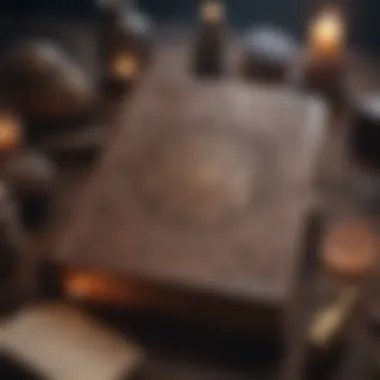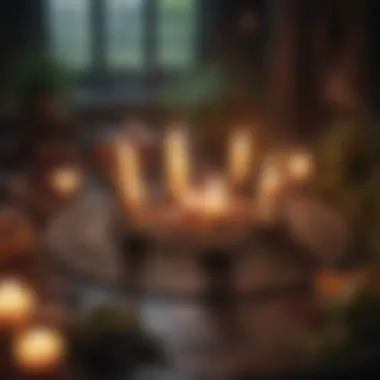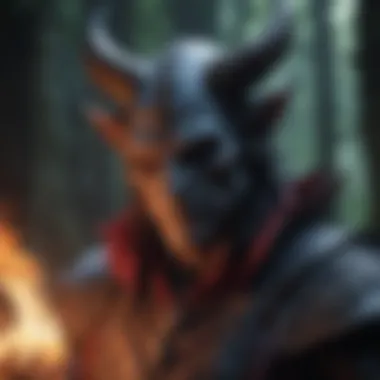Demons of Magick: Unveiling the Arcane


Intro
The intricate relationship between demons and magick has fascinated scholars and practitioners for centuries. This article aims to examine this connection in depth. We will delve into historical contexts, explore cultural interpretations, and analyze the psychological implications of invoking these entities.
Practices associated with demons often vary across different cultures, yet they share a common thread. Whether in ancient rituals or modern esoteric traditions, the invocation of demons serves significant purposes in achieving spiritual and metaphysical objectives. As we unfold the various aspects of this enigmatic relationship, we will also assess how ancient texts and contemporary practices continue to shape our understanding of demons within magick.
Understanding Demons
The concept of demons is crucial in the study of magick. Demons represent forces, ideas, or energies that practitioners often seek to understand, work with, or harness. Engaging with demons opens doors to both knowledge and deeper self-reflection. In this exploration, we will look closely at the meanings of demons from various cultural perspectives and the historical context that shapes our contemporary understanding of these entities.
Definitions and Cultural Perspectives
Demons are often seen as spirits or beings with motivations that can range from benevolent to malevolent. Definitions vary widely across cultures, impacting how magick practitioners perceive and interact with these entities.
In Western traditions, demons are frequently associated with evil and temptation, drawing from theological frameworks found in Abrahamic religions. For example, Christianity depicts demons as fallen angels, redeemed from the grace of God, acting as tempters and adversaries to humanity.
In contrast, Eastern perspectives may portray demons differently. In Buddhism, beings commonly referred to as demons are often seen as representations of ignorance, suffering, or obstacles on the path to enlightenment. In this light, understanding demons becomes a challenge to overcome one’s inner struggles rather than an external battle.
Understanding the various definitions allows practitioners to approach magick more thoughtfully. Each cultural viewpoint offers unique insights into the nature of demons, informing rituals and practices in meaningful ways.
Historical Context of Demons
The history of demons stretches back to ancient civilizations, where they occupied significant roles in mythology and religion. As societies formed and religions evolved, the perception of demons transformed significantly. Ancient Mesopotamian cultures depicted demons as agents of chaos but also as protectors of cities and individuals, showcasing a complex relationship.
The Greeks entertained the idea of daemons, which were not inherently evil. These entities guided individuals toward enlightenment and wisdom. The philosophical concepts interwoven with these beliefs further added depth to the understanding of demons.
During the Middle Ages in Europe, fear of demons escalated amidst religious turmoil. The Inquisition brought about witch hunts where many were accused of consorting with demons. This period solidified the connection between demons and dark magic in the Western psyche, lasting into modern times.
"The historical portrayal of demons shapes not only individual beliefs but also societal norms regarding good and evil."
Many contemporary spiritual practices still draw from these historical frameworks. Understanding this context helps practitioners recognize the deeper implications of invoking demons in their rituals today. It also urges a reconsideration of how these entities might be viewed not as purely negative forces but as complex beings deserving of deeper exploration.
Overall, by grasping the definitions and historical contexts surrounding demons, individuals engaging in magick can cultivate a more nuanced approach, enriching their practices with knowledge and understanding.
The Concept of Magick
The concept of magick plays a crucial role in understanding the intricate relationship between demons and the realm of the arcane. It serves as a foundation for examining how practitioners interact with various entities and the intent behind such interactions. Magick is not merely about casting spells or invoking spirits. It encompasses a broader philosophical framework that includes beliefs, rituals, and the metaphysical forces at play.
By defining magick, we further highlight its significance. It is seen as a method or practice that aims to influence the physical or spiritual world. This influence is achieved through symbols, words, and ritual actions that hold specific meaning and power. The practice of magick requires a deep understanding of the universe and oneself. The knowledge involved can shape one's reality and facilitate personal growth. Such awareness can lead to positive results when performed responsibly.
Origins and Evolution of Magick
The evolution of magick dates back to ancient humanity. Its origins are intertwined with early spiritual practices and the search for understanding the cosmos. As civilizations developed, so did the concepts and methods of magick. Many early societies employed ritualistic practices to communicate with the divine or manipulate nature.
Over time, magick has fragmented into various systems. The influence of Greek philosophy, which introduced logical inquiry, significantly shaped magical practices in the Hellenistic period. In the Middle Ages, the association between magick and heresy led to a decline in its acceptance. However, during the Renaissance, a revival occurred, emphasizing the importance of personal enlightenment and knowledge. This shift paved the way for contemporary practices that blend science and spirituality, reflecting an ongoing evolution.
Types of Magick Practices
Many forms of magick practices exist, each with unique characteristics and purposes. Understanding these types is essential for grasping the overall concept of magick.


- Ceremonial Magick: This form involves a systematic approach, often using complex rituals, to achieve a specific outcome. Practitioners may focus on invoking deities or using symbolic tools to guide their practice.
- Wiccan Magick: Wicca prioritizes nature and the cycles of the earth. Rituals are often performed to align with lunar phases and seasonal changes, promoting harmony with the natural world.
- Chaos Magick: This modern form emphasizes adaptability. Practitioners draw from various traditions, altering techniques to fit their needs. It promotes the idea that belief itself can be a tool of power.
- Folk Magick: Rooted in cultural heritage, folk magick encompasses community-centric practices. It often involves the use of herbal remedies, charms, and rituals passed down through generations.
By delving into these practices, we can better understand how demons are incorporated into magick. Each tradition brings its own perspective on demonic entities, shaping their role in various rituals and beliefs.
"Magick is the art of changing consciousness at will." – Dion Fortune
Recognizing the diversity in magick practices is vital as it reflects the ongoing dialogue between cultural belief systems and the enigmatic nature of demons. Understanding how these elements interact enhances our comprehension of magick itself.
Demons in Different Traditions
The examination of demons across various traditions serves to elucidate not just the nature of these entities but also their role in the broader context of magick. Each tradition provides a unique lens through which to understand demons, reflecting the beliefs, practices, and societal structures of the cultures that give rise to them. This exploration reveals how demons symbolize more than mere adversaries; they often embody deep-seated fears, moral struggles, and the mysteries of the human psyche.
Western Esoteric Traditions
In Western esoteric traditions, demons often appear as complex figures that exhibit a blend of fear and fascination. From the medieval grimoires, like the Key of Solomon, to modern interpretations in Thelema, demons are seen as powerful beings that can be summoned for knowledge or power. Practitioners, or magicians, often engage in invocation or evocation rituals to harness these entities' abilities. The approach towards demons differs; some view them as fallen angels or spirits that can be coerced into servitude, while others treat them as guides that help practitioners confront their inner shadows. The symbolic nature of these demons represents the struggle between light and darkness within the self.
Eastern Philosophies and Practices
Contrasting with Western views, Eastern philosophies present a more nuanced understanding of demons. In Buddhist traditions, for example, demons are often seen not as external beings but as manifestations of ignorance and attachment, which hinder spiritual progress. These entities, known as mara, symbolize the inner obstacles practitioners face on their path to enlightenment. In Hinduism, demons, or asuras, represent chaos and moral decline but also play crucial roles within the cosmic balance. Rituals in these cultures may involve chanting, meditation, or offerings, focusing more on inner transformation than external domination. Here, demons serve as vital teachers rather than purely malevolent forces.
Indigenous and Folk Beliefs
Indigenous and folk beliefs often blend the spiritual with the material, where demons embody natural elements or ancestral spirits. These traditions view demons not solely as dark forces but as vital aspects of the universe's complexity. Many indigenous cultures have rich oral traditions that narrate the interactions between humans and these beings, portraying them as protectors, tricksters, or messengers. Rituals involving these demons are often community-oriented, aiming to restore harmony or promote healing. Understanding these beliefs invites a larger narrative about how cultural contexts shape the perception of demons and their functions within society.
"Demons function not only as fearsome entities but as mirrors reflecting human nature and societal values."
Rituals Involving Demons
Rituals involving demons encompass a significant aspect of magick practices throughout history. These rituals reflect the deep-seated beliefs and cultural attitudes towards unseen entities. Practitioners who engage in such rituals often seek specific outcomes or spiritual enlightenment. Understanding the nuances of these rituals is essential for grasping how demons intersect with magick.
Invocation and Evocation
Invocation refers to the act of summoning a demon into oneself, allowing the spirit to influence or take control of the practitioner. This process often aims to tap into the demon's powers, enhancing the practitioner’s abilities or insights. The careful preparation is key; a well-defined intention is crucial to ensure focused energy.
On the other hand, evocation involves summoning a demon externally, compelling it to appear in a specific location. This method often requires the practitioner to create a protective circle to ensure safety; after all, dealing with these entities can be dangerous. The separation between the magician and the demon allows for a different dynamic, often encouraging negotiation or a transaction.
Both methods require deep respect for the entities being invoked or evoked, as treating them as mere tools could lead to unforeseen consequences. The rituals often involve intricate chants, sigils, and offerings designed to appeal to the entities, establishing a relationship built on mutual understanding and respect.
Sacrifices and Offerings
Sacrifices and offerings are traditional components in rituals related to demonology. These acts serve as gestures of respect or gratitude towards the spirits. Practitioners believe that offerings can influence the favor of the demon, thereby increasing the likelihood of achieving desired outcomes.
Common offerings include:
- Food and drink: Sometimes, inviting a demon into a ritual space with food helps create a connection.
- Symbolic items: Objects of personal significance may be used, with the belief that these items carry the practitioner’s energy.
- Blood: Although controversial, some rituals include animal sacrifices as a more potent offering. This practice is often viewed with caution due to ethical considerations.
It is important for practitioners to assess their motivations behind such offerings carefully. Ethical dilemmas arise, especially if practitioners engage in harmful practices. A thoughtful approach can lead to deeper spiritual connections without compromising moral integrity.
Tools and Symbols in Demonology
Tools and symbols serve as essential elements of rituals involving demons. Various items can aid practitioners in focusing their intentions and harnessing energies. Some common tools include:


- Wands or staves: Used to direct energy towards specific goals or summon demons.
- Altar setups: A dedicated altar can create a sacred space, adorned with symbols and items relevant to the ritual.
- Sigils: Drawn symbols representing specific demons can act as gateways, making it easier for practitioners to summon these entities.
Each tool carries significance that reflects the practitioner’s intentions. The choice of symbols is often based on personal belief systems or tradition. Ensuring that these tools are consecrated and treated with reverence fosters a better connection with the supernatural.
The Psychological Dimension
The exploration of the psychological dimension within the context of demonology and magick is vital. Understanding how demons can intersect with the mind reveals much about the human experience. The study of demons can serve as a mirror reflecting our deepest fears, desires, and unresolved conflicts. This section aims to illuminate the psychological intricacies that shape our interactions with these entities.
The Role of Archetypes in Magick
Archetypes are fundamental models or symbols that influence human behavior and thought processes. In magick, demons often embody these archetypes reflecting various aspects of human nature. By engaging with these archetypal figures, practitioners may gain insight into their own psychological makeup.
For example, a demon associated with wrath may represent repressed anger that needs acknowledgement. Recognizing such connections can serve as a path for personal growth and understanding.
Some key points about archetypes in magick include:
- Identifying archetypes: Recognizing which demons might resonate with inner struggles.
- Integration: Learning to integrate the energy of these archetypes into one's life positively rather than allowing them to manifest negatively.
- Reflection: Demons can provoke deep personal reflection, exposing areas of one's psyche in need of work.
Practicing this type of introspection can lead to a more holistic approach to magick. It opens up opportunities to engage in rituals that are not just about summoning external forces, but also about addressing internal conflicts.
Demons as Projections of the Self
The concept of demons as projections of the self is another crucial psychological element. This idea suggests that the demons encountered in magick may not exist as external entities but as manifestations of one's own psyche. These projections can range from suppressed emotions to unresolved trauma.
When a practitioner invokes a demon, it may evoke aspects of themselves they have not reconciled. This problem is not just spiritual; it is deeply psychological. Engaging with these projections can provide valuable lessons. For instance:
- Understanding fears: Realizing that fearsome entities might represent one’s own fears, insecurities, or traumas.
- Personal empowerment: By confronting these projections, practitioners can reclaim power over their own narratives.
- Therapeutic benefits: Engaging with demons symbolically in a controlled ritual environment can have therapeutic effects.
"Understanding demons serves to better understand oneself, leading to inner healing."
The psychological dimension brings a layer of depth to the practice of magick. It fosters a dialogue not only with external symbols but also with the inner self. By embedding this understanding into practices, individuals can experience a more profound connection to their spiritual path. Incorporating psychological insights allows for a more robust approach to both demonology and magick.
Case Studies of Demonic Encounters
Case studies involving demons offer invaluable insights into the practices, beliefs, and experiences of those who have engaged with these entities. By examining both historical records and contemporary testimonies, we can better understand the complex relationship between magick and the manifestation of demons. Such studies not only help clarify the motivations behind various rituals but also reveal the psychological and cultural impacts of these encounters. They provide an empirical basis for analyzing the significance of demons within the broader context of esoteric practices.
Historical Accounts
Historical accounts of demonic encounters often reflect the cultural anxieties and beliefs of their time. These documents range from ancient texts to medieval grimoires, each offering unique perspectives on demons and their roles in society. For instance, the Malleus Maleficarum, or The Hammer of Witches, published in the late 15th century, is notorious for its witch-hunt narratives and detailed descriptions of demonic possession. This text illustrates how societal fears were channeled into the perception of demons as malevolent forces.
Another significant historical source is the Testament of Solomon, which recounts King Solomon's control over demons to achieve his objectives. The text highlights a pragmatic approach to demonology, emphasizing the importance of wisdom and understanding in one's dealings with these entities. Such accounts not only illuminate the beliefs of their era but also serve as cautionary tales about the consequences of invoking demons without proper knowledge or respect.
These examples form a foundation for understanding how historical perspectives on demons shape contemporary beliefs. They also offer lessons about the potential dangers of misunderstanding or misrepresenting these complex figures in magick.
Contemporary Experiences
Contemporary experiences of demonic encounters reflect a shift in how people engage with these entities. Numerous individuals report encounters that challenge traditional notions of good and evil. For many, demons are not merely symbols of negativity; they often represent personal struggles or fears. Modern seekers of magick use these encounters as means of psychological exploration and self-discovery.
Many contemporary practitioners document their experiences in online forums, social media, and podcasts. These personal narratives reveal a diverse range of interactions—some report feelings of empowerment after engaging with a demon, while others express deep fear and anxiety. Platforms such as Reddit have become gathering places for sharing and discussing these experiences, fostering community and support among those interested in the arcane.
The narratives of modern practitioners underline that while demons may still carry the stigma of darkness, they can also embody transformation and growth.


In addition, the integration of psychological theories, such as Carl Jung's archetypes, plays a significant role in interpreting these recent encounters. Many practitioners view demons as projections of their inner conflicts, thereby transforming how they engage with these entities. This perspective encourages not just fear but also acceptance and integration of various aspects of the self.
Through both historical and contemporary lenses, case studies of demonic encounters reveal the evolving nature of beliefs surrounding demons in magick. They highlight the continuous interplay between individual experience and cultural context, urging us to approach this enigmatic subject with both caution and curiosity.
Ethical Considerations in Demonology and Magick
The interplay between demonology and magick is intricate and demands a careful examination of ethical considerations. This section explores why addressing ethical issues is crucial for practitioners and enthusiasts of magick.
Practicing magick often involves invoking or working with demons. Understanding the responsibilities that come with such actions is vital for fostering a safe and respectful environment. Engaging with these entities is not merely a recreational endeavor; it can lead to unintended consequences, both personally and broadly within community contexts.
One key aspect to consider is the consequences of invocation.
Consequences of Invocation
Invocation, as a fundamental practice in ritual magick, involves calling upon a demon for assistance or guidance. The repercussions of such calls can vary significantly. Understanding these consequences aids practitioners in making informed decisions.
- Psychological Impact: Engaging with demons can trigger profound psychological experiences. Practitioners must recognize that these interactions might unearth inner fears or insecurities, leading to a lasting psychological effect.
- Spiritual Consequences: Invoking a demon can lead to spiritual repercussions. These may manifest as disturbances in one's personal energy or unwanted attachments.
- Community Perception: How one engages with demons can affect the wider perception of magick communities. Negative experiences shared by others can shape public understanding and acceptance of such practices.
"Ethics in magick is largely about understanding the potential impact of one's actions on self and community."
Commitment to ethical practice promotes safety and sustains a respectful atmosphere in the magickal community. This leads into the next consideration: cultural appropriation and sensitivity.
Cultural Appropriation and Sensitivity
Cultural appropriation remains a significant concern in the practice of demonology and magick. Many magickal practices involve traditions from diverse cultures. Practitioners must tread delicately to avoid appropriation, which is often characterized by the unacknowledged or distorted use of cultural elements outside their original context.
- Respect for Traditions: A foundational principle is respect. Recognizing and valuing the origins of specific practices enables practitioners to engage in a more informed way. This means honoring the lineage that birthed such magickal systems.
- Awareness of Impact: Practitioners should be aware of how their actions may perpetuate harmful stereotypes or neglect the significance of certain rituals to the originating cultures.
- Community Engagement: Engaging with practitioners from the culture you are interested in can help bridge understanding. It opens avenues for education and collaboration, rather than appropriation.
Recognizing the ethical considerations in demonology fosters a more inclusive and respectful practice overall. Balancing personal aspirations in magick with communal awareness is essential for sustaining a responsible approach to the craft.
The Future of Demonology in Magick
The exploration of demonology within the realm of magick is increasingly revealing intriguing trends and interpretations. Understanding the future direction of this topic is essential as it sheds light on evolving practices and beliefs. This area of study combines traditional practices with contemporary insights and technology, providing a rich landscape for investigation and interpretation.
Demonology has long been a subject of fascination, not only for scholars but also for practitioners seeking deeper wisdom. Recent shifts in societal attitudes, along with the influence of global connectivity, have synthesized ancient knowledge with modern ideas, creating new paradigms. This fusion is vital for comprehending the evolving narrative of demons and their roles in magick today.
Emerging Trends and Interpretations
Emerging trends in demonology reflect a broader societal transformation. One prominent trend is the growing acceptance of personal interpretations of demons and their significance. Practitioners now are engaging in tailored practices, often drawing from multiple cultural traditions and interpretations. This customization allows individuals to connect with entities that resonate with their experiences and worldviews.
While traditional demonology often emphasized fear and strict adherence to established rituals, contemporary interpretations focus on empowerment and personal growth. For some, demons represent challenges to overcome, rather than mere adversaries. This shift highlights a broader trend of viewing these entities as part of one's psychological landscape, rather than external threats.
- Increased focus on self-discovery through demonology
- Blending of various cultural practices in personal rituals
- Growing emphasis on empowerment and transformation
The dialogue surrounding demonology is becoming more inclusive, with voices from diverse backgrounds contributing to the conversation. This evolution encourages a broader spectrum of practices, enriching the field and inviting collaboration between different traditions.
The Role of Technology in Ritual Practices
Incorporating technology into ritual practices is significantly transforming demonology. Digital platforms allow practitioners to share knowledge, experiences, and resources at previously unimaginable speeds. Online forums and social media, such as Reddit and Facebook, create spaces for collective exploration and support. This accessibility can foster a more inclusive atmosphere for those interested in demonology.
Automated tools, mobile applications, and virtual environments also contribute to modern rituals. Practitioners can use software to assist with spellcasting, creating visualizations, or tracking their progress. These innovations support an individual's exploration of their beliefs and practices.
"The modern practitioner does not just follow tradition; they innovate and explore the magickal system for their needs."
Moreover, virtual reality experiences related to demonology and magick are emerging, allowing users to immerse themselves in historical practices or simulated rituals. Such environments can provide insight into the feelings associated with these experiences, regardless of physical space.
Ultimately, the engagement of technology in demonology and magick reflects a significant shift in how individuals interact with the spiritual realm. With this blend of old and new, the future of demonology stands poised to expand and adapt, inviting enthusiasts to explore and engage with the arcane in ways previously unimagined.







